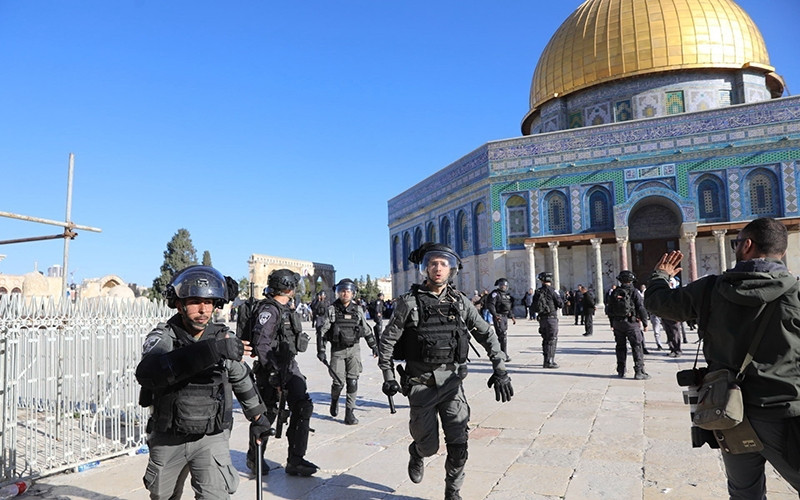Violence between Israel and Palestine in the West Bank, particularly around the Al-Aqsa Mosque temple complex in East Jerusalem, has escalated to a dangerous level overthe past few weeks.
On the night of April 21, a rocket was fired from Gaza into southern Israel. This was the first rocket since January to fly from Gaza towards Israel. Immediately, Tel Aviv retaliated with a series of airstrikes against central Gaza. The Israeli military also attacked an underground factory that Tel Aviv accuses of making rockets. The Palestinians responded with four rockets.
Tensions have escalated in Israel and the Palestinian territories related to the Al-Aqsa temple complex, which Israelis call the Temple Mount, a site sacred to both Muslims and Jews. The security situation is more worrisome as the Muslim holy month of Ramadan coincides with the Jewish Passover and the Christian Easter. When celebrating together at Al-Aqsa Mosque, it is not excluded that some Muslims and Jews could not keep their composure leading to clashes, causing an outbreak of violence.
From April 15 to now, fighting between Israeli and Palestinian forces at the Al-Aqsa temple complex has injured at least 200 people on both sides. The tit-for-tat conflict between Palestine and Israel has caused great concern to the international community, potentially pushing the Middle East peace train off the track and making it difficult to return to the station in time as scheduled.
The United Nations and relevant countries have made efforts to de-escalate tensions. Speaking at an emergency meeting of the United Nations Security Council, the United Nations Special Coordinator for the Middle East Peace Process, Tor Wennesland stressed that violence and tensions escalated between Israel and Palestine once again show the importance of conflict management efforts.
According to him, the parties need to immediately de-escalate tensions, contain and resolve the root causes of the conflict, as well as strengthen the financial stability of the Palestinian government and institutions and end the occupation toward a two-state solution.
The ultimate goal is that the two states live side by side in peace and security following United Nations resolutions and international law, Tor Wennesland said. He affirmed that the United Nations will continue to coordinate with regional and international parties and partners, maintaining its commitment to support Israel and Palestine to achieve this goal.
US President Joe Biden had a phone call with Jordan’s King Abdullah II, emphasising the importance of maintaining coordination to prevent the recurrence of violence in Jerusalem, which threatens regional peace.
A day before the phone conversation with the US President, Jordan’s King Abdullah II and Crown Prince of Abu Dhabi and Deputy Supreme Commander of the UAEArmed Forces Mohammed bin Zayed Al-Nahyan flew to Cairo to discuss with the Egyptian President Abdel-Fattah El-Sisi rising tensions between Israel and Palestine.
The three leaders emphasised the importance of respecting the legal and historical status quo at Al-Aqsa Mosque, calling for the resumption of serious and effective negotiations to resolve tensions based oninternational law.
Another reason may adversely affect the security situation in the Middle East. These are rising prices and supply chain disruptions, threatening food security for the poor and vulnerable in the occupied Palestinian territories. High prices of construction materials have also affected reconstruction efforts in Gaza.
Coordinator Tor Wennesland warned that without additional funding, the UN World Food Programme and the UN Relief and Works Agency for Palestinian Refugees would be unable to meet the food needs of the Palestinian people, putting the Palestinians at risk of instability, especially in Gaza.
As the Israeli-Palestinian conflict continues, acts of violence, provocation and incitement must cease. The parties need to de-escalate tensions and exercise restraint so that the Middle East train continues its journey to the station of peace.
















